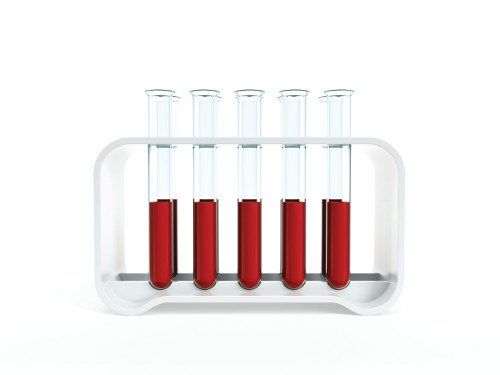Whey protein explored for blood sugar benefits
Researchers are studying how whey protein may help manage postprandial blood sugar levels.
Photo © iStockphoto.com/Auris

Whey protein supplier Arla Foods Ingredients (Viby J, Denmark) is proposing whey protein as an ingredient for managing healthy blood sugar levels. At the Institute of Food Technologists’ Annual Meeting and Food Expo in Chicago in July, the company made its first U.S. launch of a new pre-meal whey protein shot meant to help prevent postprandial blood sugar spikes and prevent postprandial hyperglycemia.
Arla isn’t alone in exploring this potential relationship. At IFT, Nutritional Outlook interviewed Matthew Pikosky, PhD, RD, vice president, nutrition science and partnerships, Dairy Management Inc. (DMI), at the U.S. Dairy Export Council (USDEC; Arlington, VA) booth. USDEC is the nonprofit group representing the U.S. dairy industry.
“There is some science there,” Pikosky said. “Whey proteins promote insulin secretion, so they can help, and there has been some research to show that either taking whey protein prior to a meal or as part of the meal will help cause greater insulin secretion that would lead to better blood glucose management and enhance the uptake of glucose into the cells following a large meal. So there can be some potential benefit there-for instance, for prediabetics who are looking for help better controlling blood glucose levels.”
Arla studied the effects of its Lacprodan whey protein on postprandial blood sugar in a clinical study recently published in The American Journal of Clinical Nutrition.1 The randomized, single-blind, crossover study was conducted on three test days in 11 men with type 2 diabetes. Subjects were given either intact whey protein (15 g), hydrolyzed whey protein (15 g), or a placebo, to be consumed immediately before breakfast and lunch meals. After analyzing glucose levels in the blood throughout the study day, researchers found that in the intact-whey protein subjects, total postprandial glycaemia was significantly reduced following meals, compared with the control.
Arla formulated this same 15-g dose of intact whey protein in its pre-meal shot. The company also included fiber in the shot, for additional health benefits. The shot itself is 100 ml. Peter Schouw Andersen, director, application science and technology, Arla, told Nutritional Outlook that the company purposely kept the shot size small so as minimize any interference with a person’s appetite for the main meal.
Researchers are still very much investigating whey’s mechanism of action in the blood sugar realm. Already, some observational data has shown that a higher intake of protein may enhance blood glucose control, including a 2016 study published in the European Journal of Clinical Nutrition in 2013.2
In an Arla Ingredients white paper, the company writes, “Several mechanisms have been proposed to explain how whey can exert these effects. However, the answer likely involves multiple, interconnected pathways. Firstly, bioactive peptides from digestion or hydrolyzed whey protein may activate incretin hormone (GIP, GLP-1) release. Secondly, rapid digestion of whey protein results in a rapid rise in amino acids (BCAAs), resulting in increased insulin release. Thirdly, amino acids and peptides from hydrolyzed whey protein inhibit DPP-IV, stopping the degradation of GIP and GLP-1.”3,4
The company adds, “The benefits of whey protein are supported by a growing scientific evidence base demonstrating the superior efficacy of whey protein on postprandial glucose control compared to other animal and vegetable protein sources.
Schouw said there are already existing whey-based products on the market for blood sugar management; however, he noted, “all of them are powder formulations.”
DMI’s Pikosky said that blood sugar is still a “fairly emerging area” for whey protein, albeit a promising one. “It’s not necessarily at the point where it’s made it to nutrition recommendations for people managing diabetes or prediabetes or blood glucose to go incorporate whey protein with meals. But I think it’s an area that has shown some promise, and more work is needed to refine that to see how that could be incorporated in terms of a daily meal plan,” he said.
Given the growing global prevalence of diabetes and prediabetes, whey could one day become part of the much-needed arsenal of nutrition solutions to help consumers worldwide manage blood sugar.
References:
- King DG et al. “A small dose of whey protein co-ingested with mixed-macronutrient breakfast and lunch meals improves postprandial glycemia and suppresses appetite in men with type 2 diabetes: a randomized controlled trial.” The American Journal of Clinical Nutrition, vol. 107, no. 4 (April 1, 2018): 550-557
- Gunnerud UJ et al. “Effects of whey protein on glycaemia and insulinaemia to an oral glucose load in healthy adults; a dose-response study.” European Journal of Clinical Nutrition, vol. 67, no. 7 (July 2013): 749-753
- Arla Foods Ingredients white paper. “Whey protein for improved blood glucose control.” 2018
- Adams RL et al. “Insulinotropic effects of whey: mechanisms of action, recent clinical trials, and clinical applications.” Annals of Nutrition & Metabolism, vol. 69, no. 1 (2016): 56-63
Kratom sees impressive sales growth despite its regulatory status and stigma
March 12th 2025Despite its controversy, kratom is a top-selling ingredient that consumers see value in. That said, brands need to work hard to demonstrate safety and quality of kratom products in the absence of legal regulatory status. Will kratom be able to overcome its stigma for even more growth and consumer acceptance?
DOJ asks Utah court to dismiss FTC lawsuit against Xlear Inc.
March 11th 2025On March 10, the DOJ and the defendant filed a stipulation to dismiss with prejudice the lawsuit in which each party agrees “to be responsible for its own costs and fees and agrees that no party shall be responsible to any other party for any fines, costs, fees, or penalties arising from this case.”











